Executive Summary
This is a training and development proposal presented to Dubai Ports World (DP World) by Talent Consulting Inc for its newly hired mid-level managers. Talent Consulting Inc has over 30 years of experience in training and human capital development in both the private and public sectors globally. The company has transformed many organizations in the Middle East region. It understands the leadership challenges and dynamic characteristics of newly recruited employees and critical aspects of human resource management in modern firms.
The training and development proposal has considered the ADDIE Model because of its clarity and well-defined stages. This will result in a systematic and well-developed training and development program. At the same time, it recognizes that trainees are adults. In this regard, the training and development proposal has incorporated elements that will facilitate adult learning.
The actual workshop has clearly defined training objectives based on DP World leadership objectives, core values, and global strategic objectives. It also considers skills and knowledge gaps among trainees at personal levels. Various modes of presentations have been included to facilitate learning. It is expected that the training and development program will have positive impacts on employees.
The implementation plan and schedule will ensure that the workshop is accomplished within the specified period.
The Kirkpatrick Model will be used to evaluate the training and development outcomes. This model accounts for four critical elements in all training and learning programs. Talent Consulting Inc will ensure that DP World understands the relevance of evaluation processes. Feedback from the evaluation outcomes will be used to improve future training. Results will be disseminated to respective stakeholders based on the initial objectives of the proposal.
An Overview Statement
Over the past few decades, Talent Consulting Inc. has found opportunities to work and train many leaders, mid-level managers, and employees in both developed and developing countries. While in the recent past, many discussions have focused on growing organizational portfolios, investment in technologies, and pursuing new projects, it is becoming obvious that issues that relate to talent and leadership training and development have gained attention lately because executives have recognized the need to ensure successful future operations.
Talent Consulting Inc has helped many organizations to find the path to success and sustainability by focusing on unique attributes of organizations and their people. In the process of developing the next generation of leadership, the company has recognized both similarities and differences in leaders and their followers. While the issues could be different, they touch on key factors that executives ponder, particularly on identifying and developing the generation of leaders with high potentials amidst scarcity of resources, talents, and qualified employees.
At the same time, the company has also noted that the Middle East has started to attract talents from other regions, but hardly do they meet the required leadership characteristics. As workforce demographics characteristics continue to change, employers experience scarcity of skilled labor, management talents, and leadership skills that can steer companies into the unknown future. Moreover, Talent Consulting Inc has noted that higher education trains many students on technical and theoretical concepts, and therefore, many recruits and mid-level managers lack the needed skills to manage or lead others in organizations successfully. Such employees and managers, therefore, require guidance on leadership.
In the Middle East region, there are challenges of cultural differences, language barriers, and perhaps unconventional business strategies.
It is imperative for organizations to develop local talents for prosperity, and yet, many of these organizations lack effective talent and leadership management strategies. In most cases, companies have poorly developed or completely lack strategies on recruitment strategies, succession planning, performance evaluation, employee planning, and leadership identification criteria, among others.
As the world becomes a global village, companies have increased wars for talents, which have facilitated talent mobility. In this case, rich firms with financial resources and attractive work environments have always won. Other companies, therefore, compete to retain the best talents with minimal success. Such organizations must build their own talents and leaders and strive to retain them.
Talent Consulting Inc has always emphasized that companies must address their talent and leadership shortage issues through effective Leadership Capacity Development and Training Programs. This would ensure that organizations address various issues like succession planning, workforce planning, performance management, retention, and compensation, among others.
Company’s Characteristics
Talent Consulting Inc is a global human capital development and training company. The firm specializes in employee capacity building, talent management, and leadership skill development. Over the last 30 years, Talent Consulting has transformed and helped many organizations across private and public sectors.
The firm works with its clients to create and implement solutions that can assist in building employee capacities and nurturing a culture of performance through innovative approaches. As a result, Talent Consulting Inc has allowed its customers to change their practices, adapt, and achieve a competitive edge in order to tackle dynamic challenges in a global workplace. The company delights in assisting organizations in developing the required leadership capacity, improving performance, developing, and execute new business and organizational strategies.
Talent Consulting Inc aims to bridge the skills, knowledge, and attitude gaps that are common in many organizations. The firm ensures that the client takes an active role in the process throughout the training program. Talent Consulting Inc conducts gap analysis, evaluates employee competencies, and develops training and development programs to match the identified needs. Such an approach has been highly effective.
Talent Consulting Inc has established itself as a global leader in human capital development and training. It implements a wide range of solutions that ensure that learning is reaching, recognizes unique adult learners, and ensures post-training evaluation for feedback purposes.
The company’s core values include strong leadership, partnership, continuous learning, and innovation. Training and development programs are tailor-made based on the uniqueness of an organization, employees, and industry best practices.
The company has developed processes, training programs, and interventions that help businesses to transform their performances. These approaches recognize the need to ensure effective change management, as many organizations experience changes at unprecedented rates.
Talent Consulting Inc has recognized that almost all organizations are experiencing massive change. As a result, many organizations face tougher processes as they strive to adopt new practices. Change is good for any organization. Talent Consulting Inc goes the extra mile to understand the diverse needs of the client, its business strategies, strategic directions, and operational challenges and stages. The company analyzes all human resources challenges, including assessment of newly recruited managers to understand their challenges and gaps in skills and knowledge. It then develops interventions that meet the identified issues. The developed interventions are pragmatically based on effectively collected data. The company has an efficient system of analyzing, interpreting, and disseminating outcomes.
Talent Consulting Inc has created and maintained an extensive database of highly effective solutions across different industries. Hence, it approaches any challenge with effective and highly structured solutions. Talent Consulting Inc will assist any organization in achieving the following:
- Improve business processes;
- Enhance sustainability in performance among leaders and employees;
- Implement effective change management and processes;
- Evaluate on-going activities;
- Develop leadership skills to achieve business and organizational strategies;
- Ensure effective teamwork and collaboration across different business units;
- Address key factors that drive business change and processes.
The Team’s General Educational Approach and Theories and Literature Review
Training and development programs rely on different theoretical concepts to ensure effective training and outcomes (Thacker & Blanchard, 2010). In addition, frameworks in training and development assistance in managing various processes involved.
One model that many trainers use is the ADDIE Model. The ADDIE Model encompasses a framework for creating a suitable training and development tools under five stages (Molenda, 2003):
- Analysis
- Design
- Development
- Implementation
- Evaluation
- Analysis stage
At this stage, the trainer must clarify the major challenge and identify objectives, learning conditions, and learners existing knowledge. In this case, the training and development program focuses on a group of 15 newly hired mid-levels manager at Dubai Ports World.
Trainees are adult learners who possess work experiences in different fields but in the same industry. They are expected to master organizational culture after the training and development program. The training takes into account theoretical concepts that underpin adult learning.
Malcolm Knowles introduced the term andragogy to reflect adult learning as opposed to pedagogy for young learners (Knowles, 1990). Knowles defined andragogy as “the art and science of helping adults to learn” (Knowles, 1990, p. 54). In this regard, Asún and Finger observe that the role of the teacher is to develop the environment for learning, to assist a learner in understanding his or her experiences, which aid in intellectual and personal development (Asún & Finger, 2001, p. 66). According to Knowles and colleagues, adults can only learn and acquire skills well in “relaxed, contented, flexible, supportive environments” (Knowles, Holton, & Swanson, 2005, p. 61).
These theoretical approaches show the need for teachers to create favorable environments, contents, and modes of delivery to their adult learners. The andragogical model focuses on the specific needs of adult learners because adults must understand why they need to learn new skills before embarking on learning (Knowles, 1990). In fact, adults may also engage in a comparative analysis in order to identify drawbacks and benefits associated with learning new skills. Hence, the facilitator should only aid in learning and eliminating knowledge problems that adult learners may have. This improves learning effectiveness, quality, and performance.
The learner’s self-concept is imperative in adult learning. Adults consider themselves as people who make critical decisions about their lives. In this regard, teachers must note that adults are people who have a sense of self-direction in learning.
A learner’s experience is also critical in adult education. Overall, adults have gathered diverse but useful knowledge and experiences with time. Hence, educators must recognize a wide range of differences among adult learners. These differences depend on backgrounds, levels of motivation, and learning styles. Thus, it is imperative to stress the importance of personalized learning methods in adult classrooms. Knowles and colleagues have commented that adult learners have learning resources within them (Knowles et al., 2005).
There is also the concept of adults’ readiness to learn. According Knowles and colleagues, adults get prepared to study about skills they require to understand and help them to accomplish tasks in order to adapt well in prevailing conditions (Knowles et al., 2005, p. 67). In this regard, facilitators must recognize the importance of timing adult learning because experiences and knowledge may relate with developmental activities. These developmental activities complement learning. Adult learners can acquire readiness to learning through exposure to certain roles, simulation activities, and career guidance among others (Merriam & Caffarella, 1998).
Adults approaches to learning focuses on life-centered strategies. This allows them to focus on learning as a part of their lives. Knowles and associates note that adults will learn to the extent that “they perceive that learning will help them perform tasks or deal with problems that they confront in their life situations” (Knowles et al., 2005, p. 67). Therefore, adult learning depends on skills, new knowledge, values, challenges, life experiences, and understanding that would help them to tackle real-life situations. In addition, facilitators should understand the level of motivation and experiences that drive adults to classrooms.
Design stage
This stage accounts for training objectives, evaluation tools, didactic activities, workshop lesson plan and training methodology. This process is highly structured and well defined. The training and development plan will have all elements of effective training. In addition, the consulting firm will ensure that materials are specific to reflect trainees’ needs and implemented as scheduled and intended.
There will be different strategies of instructions. There would be visual and demonstrations. Learners will express their personal experiences, demonstrate that learning has taken place and use the available materials to demonstrate learning activities.
Development stage
In this stage, Talent Consulting Inc will develop and review all materials and contents as defined in the previous stage. Different media will be used to deliver the training and development program. In addition, the consulting firm will test the materials and review them based on the feedback.
Implementation stage
Talent Consulting Inc will develop training and development processes for the newly hired mid-level managers and their instructors. This stage involves the actual execution of the training and development program. Therefore, Talent Consulting Inc will ensure that all training materials, learning outcomes, evaluation and modes of delivery are effective. The newly hired mid-level managers will be evaluated before and after the training to determine the effectiveness of the training program.
Trainees will also receive training materials, handouts and other relevant resources for the training and development program. Trainees will engage in discussions, anecdotes of personal experiences and question and answer sessions.
Evaluation stage
The evaluation stage will involve a thorough assessment of the training and development outcomes. Talent Consulting Inc proposes pretest and posttest to determine changes in trainees’ knowledge about various subject matters explored.
Actual Detailed Workshop Plan
Objectives of training and development program for newly hired mid-level managers
This is an engaging and experiential Leadership Training and Development Program. The aim is to help the newly hired mid-level managers learn new skills which are relevant to leading within DP World, and prepare them to drive the company’s business forward in line with DP World’s strategic priorities.
DP World Leadership Pillars
- Translating Strategy
- Innovation & Collaboration
- Leading Change
- Corporate Responsibility
Who should participate in this training and development program?
- Those who want to understand the behaviors that make a good leader;
- Individuals who manage or have influence of groups of people;
- Need to know what a strategy is and how delegates can implement one in their business unit;
- Wish to have knowledge of the impact of change and know what they can do to manage the change process;
- Have innovation and collaboration tools to use and to help them engage their team;
- Be able to build a plan to implement a workplace project;
- To understand and Live the values of Corporate Responsibility and ensure alignment of business objectives.
DP World Leadership Training and Development Proposal
Talent Consulting Inc has redesigned the DP World’s entire Leadership architecture to align with its corporate strategic priorities. The consulting firm has looked at linking learning opportunities to business priorities through an approach focused on outcomes. The proposal will review not only what leadership content is included but also the learning methods and context that can ensure greater relevance, accessibility and efficiency. Talent Consulting Inc has called these learning interventions ‘Leadership Training and Development Program’ because of the need for newly hired mid-level managers to learn the company’s four critical areas of business operations based global, regional, group and personal strategies.
Regardless of job roles and descriptions, the Leadership Training and Development Program experiences are designed positively affect leaders at all levels in the organization. Talent Consulting Inc uses a concept of KNOW, DO and BELIEVE throughout all the training processes.
Leaders should know and ask the following questions:
- What should I know?
- What should I be doing?
- What should I believe?
In this regard, trainees are urged to review their job roles around the four company’s Leadership Pillars of Translating Strategy; Leading Change; Corporate Responsibility; and Innovation and Collaboration. The Leadership Training and Development Program shall equip the newly hired mid-level managers and other employees with the required skills and experiences to lead as required by DP World.
Why consider these leadership pillars?
It is imperative to develop an integrated, business performance view of the work and the challenges facing leaders across all the business levels within DP World.
The challenges leaders face whatever their position or role are the same, however differ substantively. Targeting development activities and teaching to these unique challenges at each level rather than on selective leadership behaviors accelerates individual development and tightens the connection between leadership development and business results.
Talent Consulting Inc also believes that individual behaviors are relevant and can easily be arrayed and integrated into this training approach. What is just as critical however is building individual behaviors in the context of the real work and challenges in a way that increases impact and results at all levels identified.
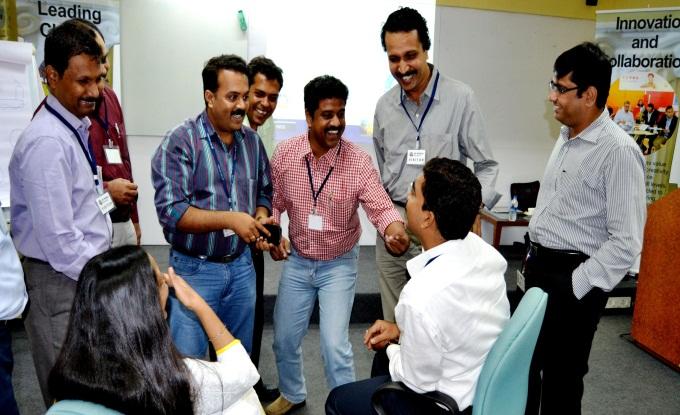
Translating strategy
Talent Consulting Inc will ensure that trainees understand the DP World Corporate Strategies so that they can implement them at Global, Regional, Business Unit and Personal levels. This would ensure that everyone understands their role in fulfilling those strategies and are able to see the bigger picture context for their work.
Innovation & Collaboration
Talent Consulting Inc will develop a training program that focuses on the company’s growth and performance, customer focus and intimacy because it recognizes that all these aspects demand high levels of leadership.
- Leaders will be required to drive and foster innovation in all aspects of their business, specifically from incremental improvements, through to new business models and ways of doing business
- Operations and functions between leaders in business units and departments will be required to spread best practices and embed innovations, as well as find opportunities for collaboration leading to innovative initiatives.
Leading Change
Accordingly, leaders will need to implement and manage change in their business units and functions. It is therefore imperative that they recognize the effects of change on their team and align their leadership behaviors and strategies to suit the context of the situation.
Corporate Responsibility
Leaders will have an increasing role in demonstrating DP World’s commitment to a widening number of stakeholders around the world.
- Customer Focus and Intimacy will also mean that DP World will need to respond to the requirements of Corporate Responsibility and Sustainability as demanded by the customers of DP World’s customers.
- DP World’s ability to demonstrate its commitment to environmental, social and community sustainability will additionally be important not just for its customers but also for its license to operate in new geographical arenas.
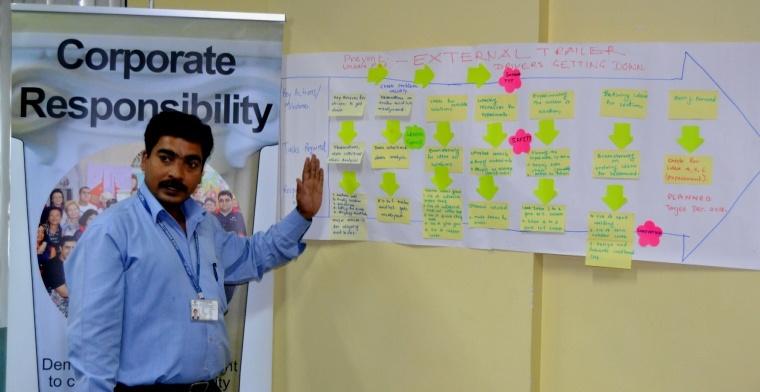
Workshop Training Schedule Overview and Implementation
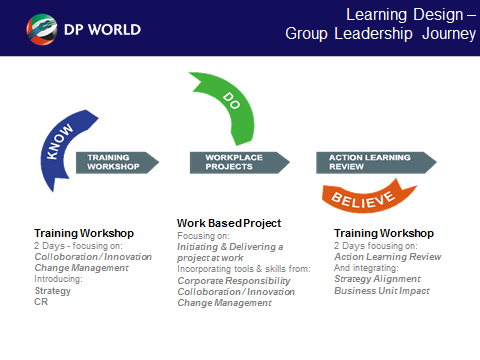
Training Mode, Method and Media
The course has been designed to include activities that demonstrate and develop skills in line with the four leadership pillars and therefore, it will be interactive as well as trainer led. PowerPoint shall be used to introduce topics and reinforce learning points. The course will target knowledge toward improving skill sets that bridge the gap between learning and application.
Participants will be encouraged to use the self-directed learning materials to reflect on the learning experience. They will be given opportunity to implement their skills during the work-based project and to reflect on these during the 2-day action-learning workshop. Training will take place in a classroom environment over a period of four days with a practical, work–based element to ensure learning is embedded and behavioral changes occur in the workplace.
The training materials will be designed to reflect elements that facilitate adult learning in a classroom environment.

Assumptions
The participant will sit with their line manager prior to attending the workshop to complete a personal program planner ‘PPP’ to access where they are against a number of journey linked statements. This ‘PPP’ will be carried out again six months after completion of the second Workshop so that a measurement of the effect of the intervention can be made.
The design of this journey assumes that participants will complete the e-learning Corporate Responsibility module in the ‘Do’ phase of the learning journey.
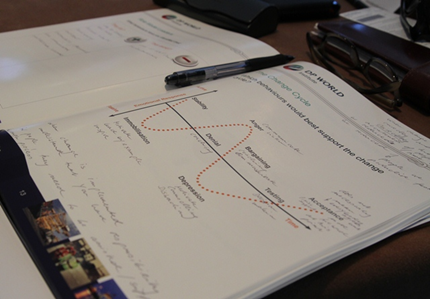
Workplace Project
The purpose of the workplace project is to ensure that the dour leadership pillars are not perceived as only a 2-dimensional subject or as just a business activity. Following an experiential model by encouraging delegates to ‘Do’ a workplace project, participants will understand the true value of these four leadership pillars.
To ensure delegates have the opportunity to practice using the skills and tools they ‘Know’ because of the first 2-day workshop.
Participants will also build up a set of reference experiences through using the tools in their workplace projects, which they will be able to reflect upon in day in the action learning process.
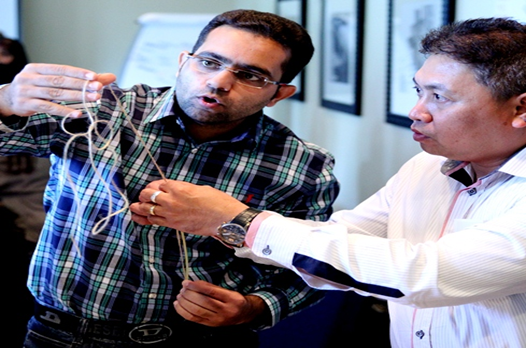
Evaluation
Talent Consulting Inc relies on the Kirkpatrick Model to conduct a thorough evaluation of the training and development program among the delegates. The Kirkpatrick Model has four components that focus on various areas of training and outcomes (Kirkpatrick, 1994).
Using the Kirkpatrick Model
Talent Consulting Inc will conduct the evaluation by using these levels of the Model.
Level 1 (Reaction)
- All participants will complete feedback questionnaire
- Participants will provide informal comments about the training program
- There will be a focus group of three members for in-depth evaluation
Level 2 (Learning)
- Participants will take both pre- and post-test evaluation tests
- Post test will be done after six months to assess on-the-job effectiveness
- Senior managers and supervisor will provide their reports on notable changes among the newly hired mid-level managers
Level 3 (Behavior)
- All participants will complete self-assessment questionnaire
- Senior managers will observe on-the-job of the trainees
- There will be reports gathered from other stakeholders, including customers and peers
Level 4 (Results)
- A review of financial reports
- Regular quality inspections
- A session with senior executives to highlight effectiveness of the training on the trainees and the company
The DP World should recognize that Talent Consulting Inc considers only relevant elements in the evaluation process to reduce costs and time required to gather and analyze data.
Talent Consulting Inc will balance its approach to collect data from relevant sources and ensure maximize accuracy of the collected data. New information may be collected when required.
Major sources of data will be:
- Online quantitative reports on personal assessments
- Performance, production and job records
- Trainees taking part in interviews, responses from customers and other stakeholders
- Supervisors’ direct observation reports
- End of training questionnaires and assessors’ rating
- In-depth reports from Focus Group sessions
Talent Consulting Inc believes that these are rich sources of information for effective training and development program evaluation.
Once Talent Consulting Inc completes its evaluation processes, it disseminates all results to managers and trainees and any other stakeholder who may need it. The consulting firm, however, considers the reasons for conducting the training and subsequent evaluation before distributing the outcomes.
Talent Consulting Inc also uses evaluation outcomes to improve its training approaches and ensure effectiveness of subsequent training and development programs.
DP World should know why Talent Consulting Inc measures training effectiveness
Talent Consulting Inc recognizes that organizations have few resources to spend on training and evaluation processes. At the same time, it also understands the essence of conducting program evaluation.
DP World should recognize that some training and development programs might fail to achieve the intended organizational outcomes and benefits. Talent Consulting Inc considers evaluations as systematic and well-developed tools for measuring training and development programs to assess any potential challenges. A successful training and development program that achieves its intended outcomes and benefits will justify all resources used and earn support from senior decision-makers.
Talent Consulting Inc also notes that business environments are highly dynamic. The company recognizes influences of external environments such as technologies, competition, laws and regulations on the business. Thus, a previously successful training approach may not deliver a similar result in a given environment, particularly among trainees with diverse demographic characteristics. The ability to measure outcomes therefore will assist in adapting to various changing situations.
Conclusion
Talent Consulting Inc developed and presented training and development proposal to Dubai Ports World (DP World) for a group of 15 newly hired mid-level managers.
Talent Consulting Inc is a highly experienced company with over 30 years in human capital training and development across the world. The company serves both private and public sectors in different industries. Talent Consulting Inc leverages on its experiences to tailor-make training and development materials that meet unique needs of its clients.
Training and development proposal for Dubai Ports World has been developed based on the theoretical model of ADDIE. The Model will ensure a systematic training through need assessment, effective design, development, implementation and evaluation of the outcomes. In addition, the proposal has acknowledged the unique characteristics of adult learners involved in the training and development program. As a result, it has ensured that training and development proposal will achieve the intended outcomes.
The Workshop plan has a clearly defined training and proposal with objectives based on the trainees’ needs and DP World’s strategic objectives and leadership core values.
At the end of the training, Talent Consulting Inc believes that newly hired mid-level managers will achieve the expected outcomes and demonstrate benefits to the company.
Evaluation process will involve the Kirkpatrick Model because of its focus on core areas of training and development programs. There would be pretest and post test to determine the effectiveness of the training program. Feedback will be used to improve training programs.
References
Asún, J. &. Finger, M. (2001). Adult Education at the Crossroads: Learning Our Way Out. London: Zed Books. Web.
Kirkpatrick, D. L. (1994). Evaluating Training Programs. San Francisco: Berrett-Koehler Publishers. Web.
Knowles, M. (1990). The Adult Learner: A Neglected Species. Houston: Gulf Publishing Company. Web.
Knowles, M., Holton, E., & Swanson, R. (2005). The Adult Learner: The Definitive Classic in Adult Education and Human Resource Development. Burlington, MA: Elsevier. Web.
Merriam, S. & Caffarella, R. (1998). Learning in Adulthood: A Comprehensive Guide. San Francisco: Jossey-Bass. Web.
Molenda, M. (2003). In Search of the Elusive ADDIE Model. Performance improvement, 42(5), 34–37. Web.
Thacker, J. W. & Blanchard, P. N. (2010). Effective Training: Systems, Strategies and Practices (4th ed.). New York: Prentice Hall. Web.

